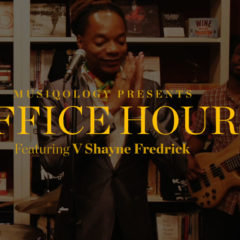This is the third track of the first edition of the Extended Play series, a new MusiQology miniseries on a theme or concept that deserves more than a single-article treatment. Giving our contributors the space to explore and develop this type of work is important because the proliferation and justification of concepts is an important skill for academic writing. Like the EP for musicians, these give us, our writers, and our readers the chance to explore themes and concepts, testing them out before delivering the full album.
Over the next several weeks, MusiQology Managing Editor John Vilanova will be doing a deep hypothetical exploration of the 2018 GRAMMY Awards nominees for Album of the Year. Each article will ask the same question of a different artist: “What would a win by this artist mean?”
It’s not often that we write about Lorde and artists like her in this digital space.
The 20-year-old New Zealander has written an album, Melodrama, that is a crafted collection of strong pop tunes all her own, eschewing the Max Martin machinery and the typical song subjects for artists her age. Her deep rasp belies her age, as does the maturity of her sound. This is sophisticated pop music that, when given a high-fidelity treatment through the right pair of headphones or speakers, reveals a triumph of studio engineering. It would be the most traditional choice among the nominees, especially considering that the last two winners were Adele and Taylor Swift, similarly skilled and polished pop-and-studio-wizards.
Now, I don’t mean to be melodramatic myself, but it doesn’t seem unfair to suggest that a Lorde win would be a statement about how the GRAMMYs perceive the nature of music, itself. I want to suggest here that Lorde’s case study activates a dichotomy that is similar enough to this long historical one to give us pause and concern should she hoist the golden gramophone on Sunday, January 28. Specifically, it would land squarely aligned with a larger history where black competitors fall along one of two equally inappropriate sides of a superhuman/subhuman dichotomy.
This is a big claim, I know, and on the surface, it may feel like a stretch. But one of the most salient points of the post-Beyoncé/Adele GRAMMYs controversy last year—and one that we’re still chewing on here at MusiQology—was a suggestion about the recording studio and its utilization by different artists. Systematic racism, Ann Powers writes in NPR, “takes the form of pervasive ideas. These include the notion that music made with ‘real’ instruments and sung straightforwardly, like Adele’s softly tinged soul or Sturgill Simpson’s raucous country, require more skill and vision than those created within the synth- and sample-driven vernacular of hip-hop; the assumption that artists who stand still and sing, like Adele, are more ‘authentic’ than those who dance, like Beyoncé, although dance and music have been inseparable at least since the Jazz Age; and the elevation of the self-contained singer-songwriter, a figure who’s almost always white, over those who work more collaboratively.”
In other words, there seems to be a certain kind of institution-level groupthink that suggests that the pop single is a higher degree-of-difficulty text than the rap or hip-hop one. A victory for Lorde is a victory for a certain kind of music-making with a certain kind of cultural meaning for a certain kind of artist. And thus the takeaway is simple: The music made by black artists is advantageous for competition despite its perceived inferiority, and a Lorde win would be the most “just” result. It’s easier for a black artist to make music that sounds good, but the GRAMMYs, in their expert wisdom, see through that advantage and award the true achievement.
This is not a new argument in competition. In fact, it is not hard to draw a straight line from this type of argument to that made about black athletes’ supposed physical and genetic superiority. Recall the persistent and long-standing rumor (still plentiful online if you spend five seconds looking) that black athletes occupy so many medal stands and spots in the running record books due to the presence of a supposed extra muscle in their legs. This, of course, is nonsensical, but it suggests a kind of assumption of superhumanity that still persists in psychological studies of white attitudes towards black athletes. Whites believe that blacks have inherent advantages, and that belief explains away black success as a byproduct of things out of everyone’s control.
In music, this kind of advantage manifests itself, surprisingly enough, as a perceived disadvantage: Black music, if the argument holds, is inherently easier than white music to record and produce. So therefore, their eligibility for the awards comes more easily. Only the golden ears of GRAMMY voters can discern the undeserving, and only their ballots can course correct for an ostensibly unfair competition.
Dehumanization, of course, is an easier connection in this case: Lorde’s music is inherently more musical than her four black male competitors. To make the kind of suggestion that Powers argues people do is to delegitimize the creative work of black artists, suggesting that their contributions ultimately create less exceptional products that are inherently less deserving of the Album of the Year title.
These articles are intended to be thought experiments—riffs on a theme to explore hypotheticals where four of the five of them will be rendered obsolete when the winner’s name is announced. But there’s something insidious about this one in particular because it gets at a broader question of musicality itself. And that is something that we need to defend passionately.

 Share On Facebook
Share On Facebook Tweet It
Tweet It








